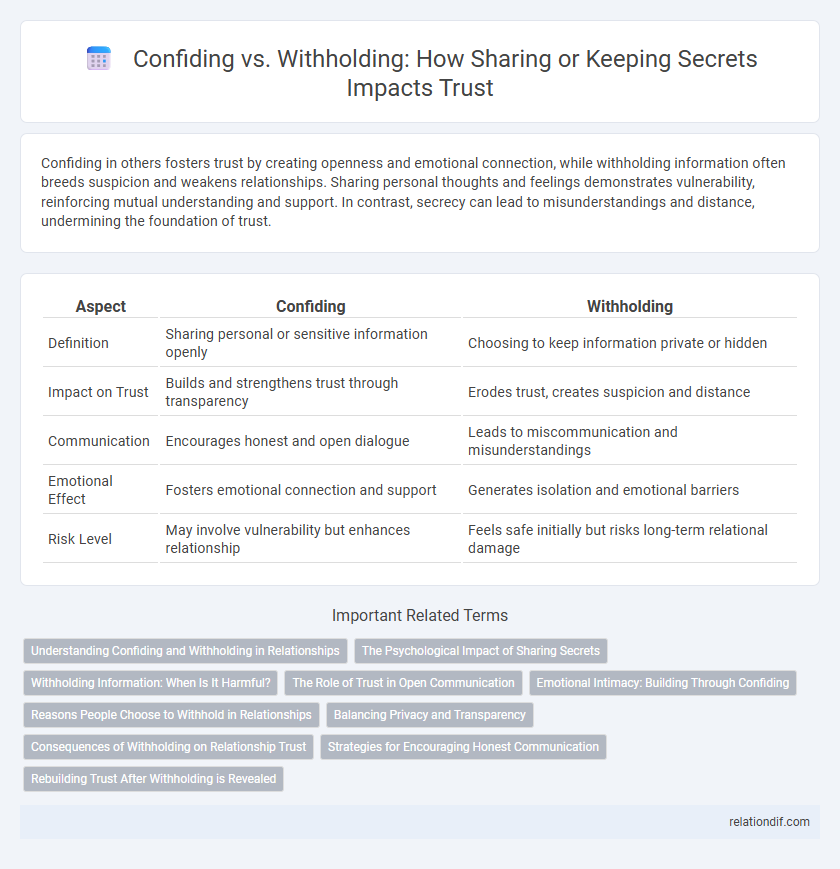Confiding in others fosters trust by creating openness and emotional connection, while withholding information often breeds suspicion and weakens relationships. Sharing personal thoughts and feelings demonstrates vulnerability, reinforcing mutual understanding and support. In contrast, secrecy can lead to misunderstandings and distance, undermining the foundation of trust.
Table of Comparison
| Aspect | Confiding | Withholding |
|---|---|---|
| Definition | Sharing personal or sensitive information openly | Choosing to keep information private or hidden |
| Impact on Trust | Builds and strengthens trust through transparency | Erodes trust, creates suspicion and distance |
| Communication | Encourages honest and open dialogue | Leads to miscommunication and misunderstandings |
| Emotional Effect | Fosters emotional connection and support | Generates isolation and emotional barriers |
| Risk Level | May involve vulnerability but enhances relationship | Feels safe initially but risks long-term relational damage |
Understanding Confiding and Withholding in Relationships
Understanding confiding in relationships involves recognizing the importance of open communication and emotional transparency for building trust and intimacy. Withholding information or feelings can create barriers, leading to misunderstandings and weakened bonds between partners. Prioritizing honest dialogue allows individuals to foster security and mutual respect, essential components for sustaining healthy connections.
The Psychological Impact of Sharing Secrets
Confiding in others strengthens emotional bonds by fostering vulnerability and mutual understanding, which reduces stress and enhances mental well-being. Withholding secrets often leads to increased anxiety, feelings of isolation, and a psychological burden that can impair trust and interpersonal relationships. Research shows that sharing sensitive information activates neural pathways associated with reward and social connection, highlighting the critical role of openness in maintaining psychological health.
Withholding Information: When Is It Harmful?
Withholding information becomes harmful when it undermines communication, breeds suspicion, and erodes the foundation of trust. In relationships or professional settings, failing to share critical details can lead to misunderstandings, missed opportunities for support, and damage to credibility. Transparent communication is essential to foster trust, ensuring that withholding information does not compromise mutual respect and collaboration.
The Role of Trust in Open Communication
Trust serves as the foundation for open communication, enabling individuals to confide without fear of judgment or betrayal. When trust is present, people are more likely to share honest thoughts and feelings, fostering deeper connections and mutual understanding. Withholding information typically arises from low trust levels, which hinders transparency and undermines relationships.
Emotional Intimacy: Building Through Confiding
Confiding in someone fosters emotional intimacy by creating a safe space for vulnerability and authentic sharing. Trust deepens when individuals openly express their feelings, thoughts, and fears, strengthening the emotional connection. Withholding emotions, conversely, hinders intimacy by erecting barriers that prevent genuine understanding and closeness.
Reasons People Choose to Withhold in Relationships
People choose to withhold information in relationships due to fear of judgment, potential conflict, or vulnerability that could damage trust. Past experiences of betrayal or rejection often lead to guarded communication, as individuals aim to protect their emotional well-being. Privacy concerns and the desire for autonomy also play significant roles in the decision to confide selectively or withhold sensitive details.
Balancing Privacy and Transparency
Balancing privacy and transparency in trust requires carefully confiding information while selectively withholding sensitive details to protect personal boundaries. Transparent communication enhances trust by fostering openness and accountability without compromising confidentiality. Effective trust-building hinges on discerning what to share and what to keep private to maintain respect and mutual understanding.
Consequences of Withholding on Relationship Trust
Withholding information often breeds suspicion and erodes the foundation of relationship trust, leading to communication breakdowns and emotional distance. The absence of transparency can create misunderstandings, reducing intimacy and increasing resentment between partners. Consistent withholding damages relational security, making reconciliation more difficult and trust harder to rebuild over time.
Strategies for Encouraging Honest Communication
Building trust requires creating a safe environment where individuals feel valued and understood, encouraging open expression without fear of judgment. Active listening techniques, such as reflective feedback and empathetic responses, foster honest communication by validating emotions and perspectives. Establishing clear confidentiality boundaries and consistently demonstrating integrity reinforce the willingness to confide rather than withhold information.
Rebuilding Trust After Withholding is Revealed
Rebuilding trust after withholding is revealed requires consistent transparency and honest communication to repair the breach. Acknowledging the impact of secrets and demonstrating accountability fosters emotional safety and encourages openness. Establishing reliable patterns of truthful behavior over time is essential for restoring confidence in the relationship.
Confiding vs withholding Infographic

 relationdif.com
relationdif.com